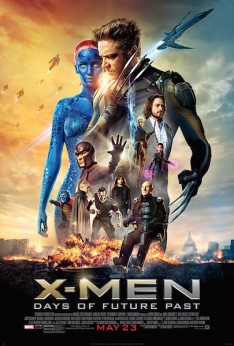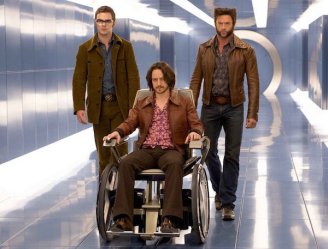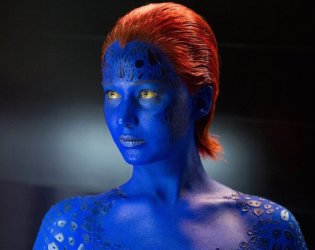Bryan Singer | 149 mins | Blu-ray | 2.39:1 | USA & UK / English | 12
 One of the big stories in the run-up to this fifth X-Men film’s release last year (my previous review is here) was that returning cast member Anna Paquin, one of the leads in the original trilogy — certainly, she’s the audience PoV character in the first one — had been virtually excised from the final cut, her subplot deemed extraneous by director Bryan Singer, as well as screenwriter Simon Kinberg, who all but admitted he’d shoehorned her into the screenplay in the first place. Instantly, a director’s cut was mooted by journalists/fans, and almost as quickly Singer and co were on board. So that’s how we end up with The Rogue Cut, which probably has all kinds of bizarre connotations if you’re not aware Rogue is a character in the series.
One of the big stories in the run-up to this fifth X-Men film’s release last year (my previous review is here) was that returning cast member Anna Paquin, one of the leads in the original trilogy — certainly, she’s the audience PoV character in the first one — had been virtually excised from the final cut, her subplot deemed extraneous by director Bryan Singer, as well as screenwriter Simon Kinberg, who all but admitted he’d shoehorned her into the screenplay in the first place. Instantly, a director’s cut was mooted by journalists/fans, and almost as quickly Singer and co were on board. So that’s how we end up with The Rogue Cut, which probably has all kinds of bizarre connotations if you’re not aware Rogue is a character in the series.
It remains a bit of a misnomer even if you do, because it’s not like Rogue has a huge part to play. Her subplot is actually more of a showcase for Ian McKellen’s Magneto and Shawn Ashmore’s Iceman, as they rescue her (with a little help from Patrick Stewart’s Professor X) from an enemy-occupied X Mansion. From there, she takes over from Kitty Pryde (Ellen Page) maintaining Wolverine’s presence in the past. In the cut released in cinemas, Kitty kept doing what Kitty was already doing, which is certainly a smoother way of handling things. Kinberg was right: this subplot feels like it’s been half-forced in, mainly to give the future-time cast extra things to do.
This sequence is not the only addition, however; I’m sure this release would’ve been perfectly adequately dubbed an Extended Cut or Director’s Cut were it not for the fan/media focus on the Rogue portions, which earnt it “The Rogue Cut” as a nickname before it was adopted as the official name. In total, the new cut is 17 minutes and 10 seconds longer, though I believe Singer said there were some deletions too, so it may be there’s slightly more than that. Either way, it’s tough to spot everything that’s been added. There are extensions littered throughout — according to the Blu-ray’s scene select menu, of the extended cut’s 44 chapters, 20 include alternate material (including the end crawl, thanks to a mid-credits scene) and two are all-new (though the theatrical cut only has 40 chapters, so I’m not entirely sure how that pans out). Most must be teeny extensions, however, and I look forward to Movie-Censorship.com doing a report so I can know all I didn’t spy. Apparently Singer and editor John Ottman discuss the changes quite a lot in their commentary track, but I haven’t taken the time to listen to that yet.
(though the theatrical cut only has 40 chapters, so I’m not entirely sure how that pans out). Most must be teeny extensions, however, and I look forward to Movie-Censorship.com doing a report so I can know all I didn’t spy. Apparently Singer and editor John Ottman discuss the changes quite a lot in their commentary track, but I haven’t taken the time to listen to that yet.
The bulk do come in the aforementioned “Rogue rescue” sequence that has given this cut its name. However, it’s intercut with some new material in the 1973 segments: Raven/Mystique (Jennifer Lawrence) also visits the X Mansion, for a little tête-à-tête with Hank/Beast (Nicholas Hoult). Both have a knock-on effect later in the movie: having taken over from Kitty, Rogue is now present throughout the climax (not that it makes much difference, besides changing Magneto’s method of entry after he barricades them in), and a brief moment — a look, no more — between Raven and Hank in the past.
Oh, and Nixon says “fuck”. That must be new, because you’re only allowed one “fuck” in a PG-13 and I distinctly remember James McAvoy saying it.
So is this cut better? Well, no. Is it worse? Well, not really. It’s just different. On the one hand, here we have some extra fleshing out of Raven and Hank’s characters, more action for future-Magneto and Iceman, and a more decent role for Rogue — though her part still isn’t much cop, all things considered. On the other hand, it makes for a slightly less streamlined film, and the intercutting between past-Magneto retrieving his helmet and future-Magneto rescuing Rogue is built like it should have some kind of juxtapositional weight but, unless I’m missing something, it doesn’t.
 The Rogue Cut is worth seeing for anyone who enjoyed the theatrical version — and, in terms of a copy to own, the Blu-ray comes with both cuts and more special features (though it loses all the extras from the first release, including a few more deleted scenes) — but, unless you’re a huge fan of Rogue or Iceman, it’s not essential.
The Rogue Cut is worth seeing for anyone who enjoyed the theatrical version — and, in terms of a copy to own, the Blu-ray comes with both cuts and more special features (though it loses all the extras from the first release, including a few more deleted scenes) — but, unless you’re a huge fan of Rogue or Iceman, it’s not essential.
As it’s fundamentally the same film, my original score stands.


 I think I’ve previously discussed my life-long love of the X-Men franchise, so I shan’t go into detail again, but suffice to say Days of Future Past has been one of my most-anticipated movies ever since the title (which is that of a classic and influential story from the comics) was announced. Thank goodness, then, that the final result doesn’t disappoint.
I think I’ve previously discussed my life-long love of the X-Men franchise, so I shan’t go into detail again, but suffice to say Days of Future Past has been one of my most-anticipated movies ever since the title (which is that of a classic and influential story from the comics) was announced. Thank goodness, then, that the final result doesn’t disappoint. Beyond that, there’s the characters: the younger versions are having to deal with the fall-out from
Beyond that, there’s the characters: the younger versions are having to deal with the fall-out from  Not everyone gets to shine in a cast this big, although pretty much everyone gets a moment. The future-set cast have the least to do, people like Halle Berry turning up to do little more than show their face, though Stewart and McKellen get a moment or two worthy of their talents. After he was the focus of the last film, Fassbender is slightly shortchanged here; but after McAvoy gave him essential support in First Class, Fassbender plays the same service here, informing Charles’ journey. Of the new additions, Evan Peters as Quicksilver (that’s the one who’ll also be played by Aaron Taylor-Johnson in
Not everyone gets to shine in a cast this big, although pretty much everyone gets a moment. The future-set cast have the least to do, people like Halle Berry turning up to do little more than show their face, though Stewart and McKellen get a moment or two worthy of their talents. After he was the focus of the last film, Fassbender is slightly shortchanged here; but after McAvoy gave him essential support in First Class, Fassbender plays the same service here, informing Charles’ journey. Of the new additions, Evan Peters as Quicksilver (that’s the one who’ll also be played by Aaron Taylor-Johnson in  Later, there’s the aforementioned ‘slow-mo’ sequence, and the grand climax, which offers more “fly something big around” antics a la First Class’ submarine, only considerably grander. Yet for all the spectacle, the final moments once again come down to character: what is Magneto prepared to do? What is Mystique prepared to do? Will anyone listen to Charles? And so on. Even the much-vaunted Marvel Studios movies tend to base their climaxes in slabs of ‘epic’ CGI crashing into each other; Days of Future Past does that for a bit, then brings the characters back into focus for the real final beats.
Later, there’s the aforementioned ‘slow-mo’ sequence, and the grand climax, which offers more “fly something big around” antics a la First Class’ submarine, only considerably grander. Yet for all the spectacle, the final moments once again come down to character: what is Magneto prepared to do? What is Mystique prepared to do? Will anyone listen to Charles? And so on. Even the much-vaunted Marvel Studios movies tend to base their climaxes in slabs of ‘epic’ CGI crashing into each other; Days of Future Past does that for a bit, then brings the characters back into focus for the real final beats. (Jennifer Lawrence being the third pillar of the past triumvirate, as they’ve already focused on Xavier and Magneto). While Days of Future Past does wrap up the majority of its threads (the open-ended ones are answered by previous films, if you want them to be), there’s plenty there to play with in the next film (and, perhaps, ones beyond that) if they want to… which they do.
(Jennifer Lawrence being the third pillar of the past triumvirate, as they’ve already focused on Xavier and Magneto). While Days of Future Past does wrap up the majority of its threads (the open-ended ones are answered by previous films, if you want them to be), there’s plenty there to play with in the next film (and, perhaps, ones beyond that) if they want to… which they do. Sometimes I find I have quite a lot to say about a film when it comes to writing my review for this blog — recently, witness
Sometimes I find I have quite a lot to say about a film when it comes to writing my review for this blog — recently, witness 